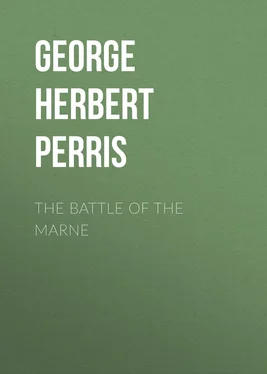George Herbert Perris - The Battle of the Marne
Здесь есть возможность читать онлайн «George Herbert Perris - The Battle of the Marne» — ознакомительный отрывок электронной книги совершенно бесплатно, а после прочтения отрывка купить полную версию. В некоторых случаях можно слушать аудио, скачать через торрент в формате fb2 и присутствует краткое содержание. Жанр: foreign_prose, foreign_antique, на английском языке. Описание произведения, (предисловие) а так же отзывы посетителей доступны на портале библиотеки ЛибКат.
- Название:The Battle of the Marne
- Автор:
- Жанр:
- Год:неизвестен
- ISBN:нет данных
- Рейтинг книги:5 / 5. Голосов: 1
-
Избранное:Добавить в избранное
- Отзывы:
-
Ваша оценка:
- 100
- 1
- 2
- 3
- 4
- 5
The Battle of the Marne: краткое содержание, описание и аннотация
Предлагаем к чтению аннотацию, описание, краткое содержание или предисловие (зависит от того, что написал сам автор книги «The Battle of the Marne»). Если вы не нашли необходимую информацию о книге — напишите в комментариях, мы постараемся отыскать её.
The Battle of the Marne — читать онлайн ознакомительный отрывок
Ниже представлен текст книги, разбитый по страницам. Система сохранения места последней прочитанной страницы, позволяет с удобством читать онлайн бесплатно книгу «The Battle of the Marne», без необходимости каждый раз заново искать на чём Вы остановились. Поставьте закладку, и сможете в любой момент перейти на страницу, на которой закончили чтение.
Интервал:
Закладка:
One of the critics General Berthaut started out to controvert is M. Fernand Engerand, deputy for Calvados, whose articles (particularly in Le Correspondant , December 10, 1917, and subsequent numbers) have been reprinted in a volume of 600 pages: Le Secret de la Frontière, 1815–1871–1914 . Charleroi (Paris: Editions Bossard, 43 Rue Madame. 1918). The French plan of campaign, says M. Engerand, was “humanly impossible. Nothing happened as our High Command had foreseen; there was surprise all along the line, and, what is gravest, surprise not only strategic but intellectual, the reversal of a doctrine of war. After the magnificent recovery of the Marne, we may without inconvenience avow that never has there been so complete a self-deception. The error was absolute and, worse, deliberate, for never was an attack more foreseen, more announced, more prophesied than that of August 1914. Strategists of the old school had not only predicted it for forty years, but had given us the means of parrying it; their ideas were scouted and their work was destroyed.”
M. Engerand quotes, in particular, Lt.-Colonel Grouard on the impossibility of an immediate French offensive beyond the frontiers (see Grouard, La Guerre Eventuelle , 1913; and L’Art de la Guerre et le Colonel Grouard , by C. de Bourcet, 1915). Grouard foresaw, among other things, that “the army of the German right, marching by the left bank of the Meuse, would pass the Sambre in the neighbourhood of Charleroi, and direct itself toward the sources of the Oise.” M. Engerand’s chapters contain a summary of the three French offensives. His general comment is: “No unity of command, separate and dislocated battles, no notion of information and safeguards before and during the combat, systematic misconception of the ground and defensive means, defective liaison between the corps and between artillery and infantry, no manœuvre, but only the offensive, blind, systematic, frantic. If we were defeated, is it an exaggeration to say that it was less by the enemy than by a false doctrine?”
Lt.-Col. de Thomasson, on these points, quotes warning notes from General Collin’s Transformation de la Guerre , written in 1911, and refers to the case of Lt.-Col. Berrot, who, in 1902, had exposed “the dangerous theories that had been deduced from the Napoleonic wars,” and who “was disgraced pitilessly, and died while yet young.”
14
Early French writers on the war found it difficult to make up their minds whether there had, or had not, been a surprise in the North. See Histoire de la Guerre de 1914 (ch. “Septembre”), by Gabriel Hanotaux. This work, the most ambitious of the kind yet attempted, is being published in fortnightly sections and periodical volumes, of which the first deals with the origins of the war, the next three with the frontier battles, and the following ones with the battles of the retreat and preliminaries of the battle of the Marne (Paris: Gounouilhou, 30 Rue de Provence).
M. Hanotaux says: “The project prepared by the German Staff of an offensive by Belgium was not a secret. All was public and confessed. There was no surprise in the absolute sense of the word. But there remained an unknown quantity: would the probable hypothesis be realised?” Later, however, he says: “The long-prepared manœuvre consisted in crushing us by the carefully veiled onslaught not of 12, but of 25, army corps, so that the surprise was double for us: the most eccentric movement and the most unexpected numbers.... It was this combination of circumstances, foreseen and unforeseen, that the French Command had to parry: political necessity, surprise, numbers, preparation, munitions.” And, again: “The invasion of Belgium by the left bank of the Meuse certainly surprised the French High Command” (“La Manœuvre de la Marne,” Rev. des Deux Mondes , March 15, 1919).
M. Reinach, usually so clear and positive, was also ambiguous on this point ( La Guerre sur le Front Occidental , vol. i.). It suffices he says, to glance at the map: “Nature herself traced this path (Flanders and the Oise). Innumerable armies have followed it, in both directions, for centuries” (p. 30). Nevertheless, the French Staff, though it had “followed for many years the German preparations for an offensive by Belgium” (p. 57), remained in an “anguish of doubt.”
Much evidence with regard to the events of the first phase of the war is contained in the reports of the French “Commission of Inquiry on Metallurgy,” 1918–19, the special task of which was to consider why the Briey coalfield was not defended. On May 14, 1919, General Maunoury testified to disaccord existing between commanding officers at the beginning of the campaign, failure to co-ordinate efforts, and ignorance of some generals of the plan of concentration. On the same day, General Michel said that, in 1911, when he was Vice-President of the Superior War Council, that is, Generalissimo designate, he submitted a plan of concentration based upon a certitude of the whole German invasion passing by Belgium and of the need of the principal French action being directed to the North. The plan was rejected, after being examined by General Brun, M. Berteaux, and M. Messimy.
General Percin, at the same inquiry (May 24, 1919), spoke of “intrigues” and a “real palace revolution” in 1911 to replace General Michel, as future Commander-in-Chief, by General Pau, the offence of the former being to have foretold that the Germans would advance by the left bank of the Meuse, and that they would at once engage their reserves. According to General Percin, in the spring of 1914 General de Castelnau said: “If the Germans extend their fighting front as far as Lille, they will thin it so much that we can cut it in two. We can wish for nothing better.” There is other evidence of this idea prevailing in the General Staff: apparently it arose from underestimates of the effective strength of the invasion.
Marshal Joffre gave evidence before the Commission on July 5, 1919, but his reported statements do not greatly help us. He defended the concentration under “plan 17,” which, he said, was operated much more to the north than in previous plans, nearly all of these foreseeing concentration south of Verdun. The French Staff was chiefly concerned to give battle only when it had its full forces in hand. The 3rd Army had a quite particular function, that of investing Metz. The plan made before the war was not absolute, but was a directive modifiable according to events. Officially, it stopped short at Hirson; but the Staff had foreseen variants to second the Belgian effort. In March 1914, the Staff had prepared a note in which it had foreseen the invasion by Belgium—a plan providing for eventualities. It was, therefore, absurd to pretend that it had never foreseen the invasion by Belgium. The Briey district was under the cannon of Metz, and could not be included in the region of concentration. The loss of the “battle of the Frontiers” was due to the fact that the best units of the German Army presented themselves on the feeble point of our front. On the French side there were failings. Generals who had great qualities in peace time failed under stress of war. He had had to take action against some who were his best friends, but believed he had done his duty. Asked by the chairman with how many rifles he commenced the war, Marshal Joffre replied, “with 2,300,000.” Lille, he said, could not be defended.
Field-Marshal French ( 1914 , ch. i.) says: “Personally, I had always thought that Germany would violate Belgian neutrality, and in no such half-hearted measure as by a march through the Ardennes.”
15
In an article on the second anniversary of the first battle of the Yser, the Temps (Oct. 30, 1916) said that, before the war, Belgium was more suspicious of England and France than of Germany. “If our Staffs had wished to prepare, for the defence of Belgium, a plan of operations on her territory, these suspicions would have taken body and open conflict occurred. Nothing was foreseen of what happened, and nothing was prepared.”
Читать дальшеИнтервал:
Закладка:
Похожие книги на «The Battle of the Marne»
Представляем Вашему вниманию похожие книги на «The Battle of the Marne» списком для выбора. Мы отобрали схожую по названию и смыслу литературу в надежде предоставить читателям больше вариантов отыскать новые, интересные, ещё непрочитанные произведения.
Обсуждение, отзывы о книге «The Battle of the Marne» и просто собственные мнения читателей. Оставьте ваши комментарии, напишите, что Вы думаете о произведении, его смысле или главных героях. Укажите что конкретно понравилось, а что нет, и почему Вы так считаете.










